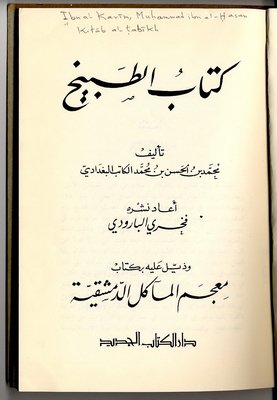Kitab al-Tabikh
Kitab al-Tabikh (Arabic: كتاب الطبيخ, The Book of Dishes) is a historical cookbook and one of the oldest surviving Arabic texts on cooking. It was compiled in the 10th century by the author Ibn Sayyar al-Warraq. This cookbook is a significant document for understanding the culinary culture of the medieval Islamic world, particularly during the Abbasid Caliphate.
Overview[edit | edit source]
Kitab al-Tabikh offers a comprehensive look at the culinary practices, ingredients, and dishes popular in the medieval Islamic world. The book not only includes recipes but also provides insights into the dietary laws, health beliefs, and social customs related to food and eating. It covers a wide range of dishes, including breads, stews, roasts, sweets, and beverages. The recipes are characterized by their sophisticated use of spices and herbs, reflecting the trade networks and cultural exchanges of the time.
Historical Context[edit | edit source]
The compilation of Kitab al-Tabikh during the Abbasid period highlights the era's emphasis on scholarship, science, and culture. The Abbasid Caliphate, with its capital in Baghdad, was a center of learning and intellectual activity. Culinary arts were no exception, and this period saw significant advancements in cooking techniques and the introduction of new ingredients from across the known world.
Significance[edit | edit source]
Kitab al-Tabikh is not just a collection of recipes; it is a window into the social and cultural life of the medieval Islamic world. The book illustrates the importance of food in hospitality and celebration, as well as the sophisticated tastes of the Abbasid elite. It also reflects the rich agricultural and trade networks that existed at the time, showcasing ingredients from as far as India, Persia, and the Mediterranean.
Content[edit | edit source]
The book is divided into several chapters, each dedicated to a different type of dish or aspect of cooking. These include chapters on bread, meat dishes, fish, sweets, drinks, and more. Each recipe is detailed with ingredients and cooking methods, often accompanied by notes on the dish's health benefits or recommended occasions for its preparation.
Legacy[edit | edit source]
Kitab al-Tabikh has had a lasting impact on the culinary traditions of the Middle East and beyond. Its recipes and techniques have been passed down through generations, influencing the cuisine of the region to this day. The book has also been the subject of scholarly study, providing insights into the historical diet, agriculture, and trade of the Islamic world.
Editions and Translations[edit | edit source]
Over the centuries, Kitab al-Tabikh has been preserved in various manuscripts, with several editions and translations making it accessible to a wider audience. The most notable translation is by the scholar Charles Perry, who has translated parts of the text into English, making it a valuable resource for historians and culinary enthusiasts interested in medieval Islamic cuisine.
Search WikiMD
Ad.Tired of being Overweight? Try W8MD's physician weight loss program.
Semaglutide (Ozempic / Wegovy and Tirzepatide (Mounjaro / Zepbound) available.
Advertise on WikiMD
|
WikiMD's Wellness Encyclopedia |
| Let Food Be Thy Medicine Medicine Thy Food - Hippocrates |
Translate this page: - East Asian
中文,
日本,
한국어,
South Asian
हिन्दी,
தமிழ்,
తెలుగు,
Urdu,
ಕನ್ನಡ,
Southeast Asian
Indonesian,
Vietnamese,
Thai,
မြန်မာဘာသာ,
বাংলা
European
español,
Deutsch,
français,
Greek,
português do Brasil,
polski,
română,
русский,
Nederlands,
norsk,
svenska,
suomi,
Italian
Middle Eastern & African
عربى,
Turkish,
Persian,
Hebrew,
Afrikaans,
isiZulu,
Kiswahili,
Other
Bulgarian,
Hungarian,
Czech,
Swedish,
മലയാളം,
मराठी,
ਪੰਜਾਬੀ,
ગુજરાતી,
Portuguese,
Ukrainian
Medical Disclaimer: WikiMD is not a substitute for professional medical advice. The information on WikiMD is provided as an information resource only, may be incorrect, outdated or misleading, and is not to be used or relied on for any diagnostic or treatment purposes. Please consult your health care provider before making any healthcare decisions or for guidance about a specific medical condition. WikiMD expressly disclaims responsibility, and shall have no liability, for any damages, loss, injury, or liability whatsoever suffered as a result of your reliance on the information contained in this site. By visiting this site you agree to the foregoing terms and conditions, which may from time to time be changed or supplemented by WikiMD. If you do not agree to the foregoing terms and conditions, you should not enter or use this site. See full disclaimer.
Credits:Most images are courtesy of Wikimedia commons, and templates, categories Wikipedia, licensed under CC BY SA or similar.
Contributors: Prab R. Tumpati, MD

